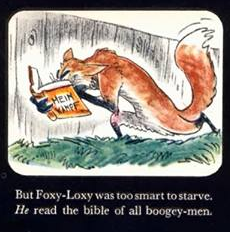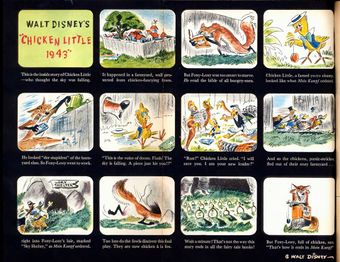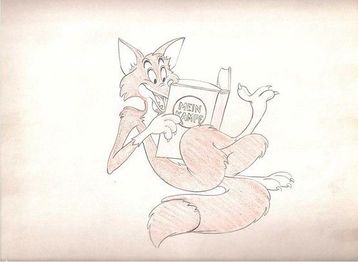Chicken Little (lost original cut of Disney short; existence unconfirmed; 1943)
Fragment of the original cut's storyboard that shows Foxy Loxy reading Mein Kampf.
Status: Existence Unconfirmed
During World War II, the Disney studios were commissioned by the U.S. Government to do various propaganda shorts, one of them was named Chicken Little (not to be confused with Disney's later 2005 CGI-animated film of the same name) and released on 1943. Based on the namesake fable, it tried to warn American audiences not to believe propaganda related to the enemy. It revolves around Foxy Loxy, a fox that uses advice from a psychology book in order to lure a barnyard's poultry community into his den and successfully kill it whole. Originally, the short was going to be less subtle on its message: Foxy Loxy would actually be reading a copy of Adolf Hitler’s Mein Kampf instead of a psychology book and the birds’ wishbones at the end of the short would be marked with swastikas; however, those ideas were later changed in order to avoid making it seem dated after the war.[1] It’s unknown if said original version was completed, released and later changed or if it was changed during production.
Differences between the Original and Final Cuts
Apart from the Mein Kampf and wishbone ideas previously mentioned, the original short was going to have less subtle dialogue that was changed after the Disney studios decided to give it a more lasting appeal. The differences between the dialogue of both the original and final cuts are described below:
| Original cut | Final cut |
|---|---|
| Foxy Loxy exclaims "Propaganda!" before consulting his Mein Kampf book for the first time. | Foxy Loxy exclaims "Psychology!" before consulting the namesake book for the first time. |
| The first line that Foxy Loxy quotes is "Propaganda must be aimed first at the least intelligent". | The first line that Foxy Loxy quotes is "To influence the masses, aim first at the least intelligent". |
| The narrator laughes before saying "Guess that’s the end of your stew Mr. Foxy Loxy!" | The narrator says the line quoted on the left without laughing first. |
| Foxy Loxy tells the farmyard turkeys that “Cocky Locky (the rooster that's the leader of the farmyard) shows definite fascist tendencies”. | The word fascist on the left quote is replaced with totalitarian. |
| Foxy Loxy ends the short by saying to the narrator "Oh yeah!? That’s how it ends in Mein Kampf!". | Foxy Loxy ends the short by saying to the narrator "Oh yeah!? Don’t believe everything you read brother!". |
Existence
In a Cartoon Research article about the short, it and its original cut are tackled.[2] The article, apart from sharing the original script, also mentions that animator Milt Gray says to have seen the original cut on a movie theater during the 1960s; however, the veracity of said statement remains unknown.
Apart from that, a respond from Chris Sobienak to a comment from Bill Cotter on the article’s comment box adds to have found what seems to be a layout sketch of Foxy Loxy reading Mein Kampf, yet it’s still unknown, as previously explained, if the short was changed during production or completed and later changed, as that sketch seems to imply one of said cases. The article itself points to the latter case, implying that the changes could have been made prior to 1950, the year on which Frank Graham (voice actor of most of the characters on the short) passed away.
Gallery
References
- ↑ A D23 article about the short that mentions its original concept. Retrieved 09 Jun '20
- ↑ The Cartoon Research article previously mentioned. Retrieved 09 Jun '20


